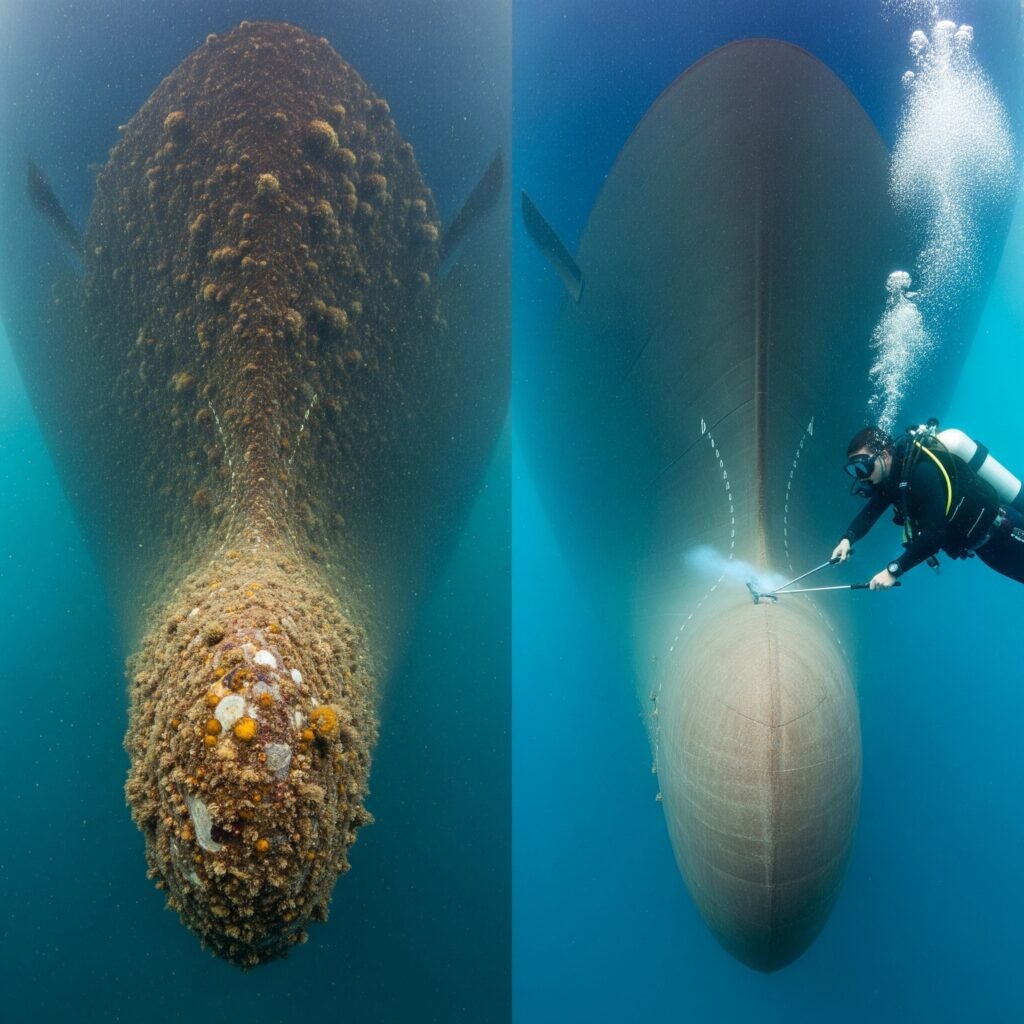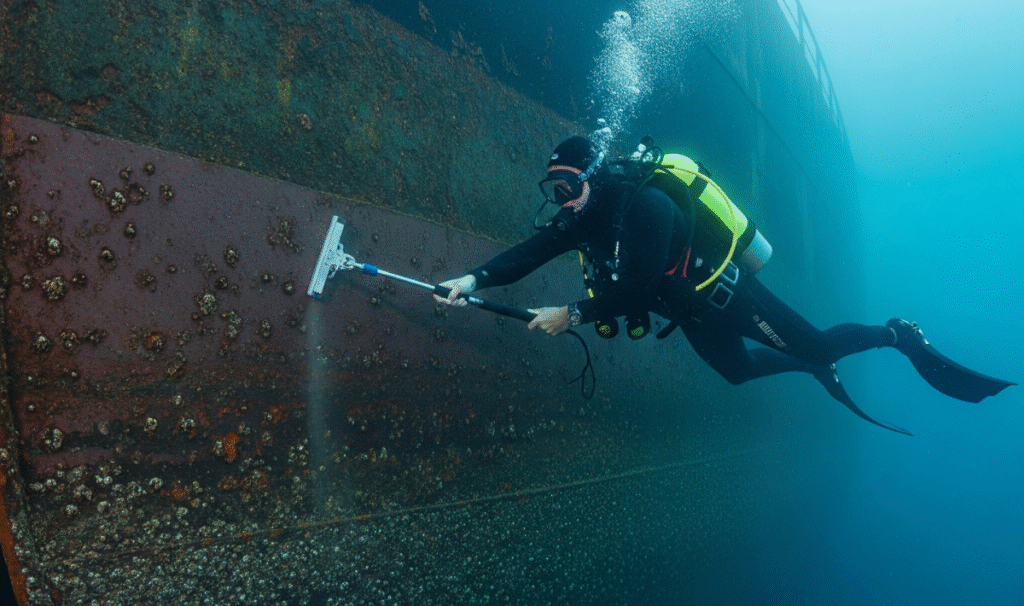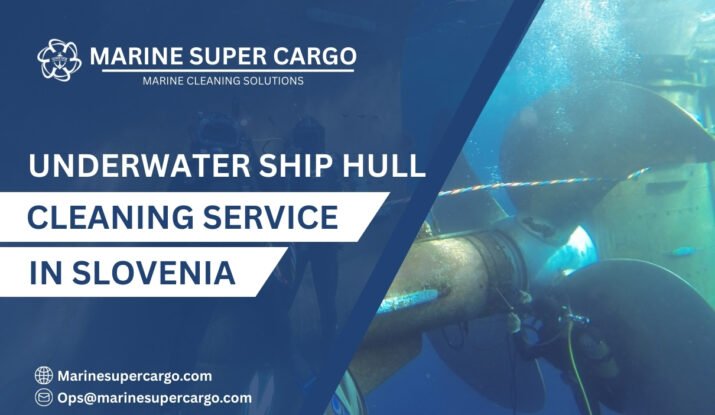Slovenia may have only 46 kilometers of coastline, but that narrow stretch along the Adriatic packs a punch. The Port of Koper acts as Slovenia’s maritime lifeline—a key gateway linking Central Europe to the Mediterranean and beyond. Every year, vessels carrying everything from cars to crude oil call here.
But there’s a challenge lurking quietly below the surface: biofouling. Marine organisms attach themselves to hulls, creating layers of drag-inducing growth. The result? Higher fuel use, faster ship deterioration, and environmental risks.
This is why underwater ship hull cleaning in Slovenia has become an essential service. Let’s explore the factors that make it vital to both business operations and environmental responsibility.
What is Underwater Ship Hull Cleaning in Slovenia?
Picture a cyclist trying to pedal with mud caked on their wheels—it slows progress dramatically. For ships, marine buildup works the same way.
Underwater ship hull cleaning in Slovenia involves divers or robotic cleaners removing fouling underneath vessels while they remain afloat. Specialized brushes, suction filters, and cavitation systems restore a hull’s smoothness without harming protective coatings.
It’s not just about appearances—it’s about efficiency, safety, and sustainability.
The Hidden Drag of Biofouling
Algae, slime, and barnacles can increase friction against water flow. Studies indicate ships with fouled hulls consume up to 40% more fuel. On busy Adriatic trade routes, these inefficiencies translate into significant economic losses.

Savings Through Increased Efficiency
Regular underwater ship hull cleaning in Slovenia reduces drag, helping ships sail faster and burn less fuel. For operators moving cargo between Koper and ports worldwide, the financial benefits are immediate. The cost of cleaning often pays back within a single voyage.
Reducing Corrosion and Hull Damage
Marine growth doesn’t just increase drag—it corrodes steel. Fouling traps water against coatings, breaking them down and exposing ships to rust.
By scheduling underwater ship hull cleaning in Slovenia, operators prevent early wear and tear. This extends hull life, protects investments, and reduces the need for expensive dry-dock repairs.
Meeting Safety and Compliance Standards
Ships docking at the Port of Koper are subject to inspections aligned with the IMO and MARPOL frameworks.
Failing inspections due to fouled hulls can lead to costly delays or penalties. Routine cleaning ensures compliance and safe passage to international destinations.
Lower Emissions and Energy Footprint
According to imo.org, shipping accounts for nearly 3% of global CO₂ emissions. Hull fouling drives these numbers higher by forcing ships to burn additional fuel.
With underwater ship hull cleaning in Slovenia, reduced drag lowers energy consumption and emissions, directly supporting climate goals.
Preventing the Spread of Invasive Species
Biofouling can unintentionally carry invasive species across oceans. In a semi-enclosed space like the Adriatic Sea, this can destabilize fragile ecosystems.
Routine cleaning in Slovenia’s ports ensures fewer species are transported, protecting local marine biodiversity.
Port of Koper – Slovenia’s Maritime Hub
The Port of Koper isn’t just Slovenia’s link to global waters—it’s a crucial hub for landlocked Central European countries like Austria and Hungary. Ships stopping here benefit from underwater ship hull cleaning in Slovenia, ensuring smoother onward journeys to global trade routes.
Skilled Workforce and Maritime Capabilities
Supported by frameworks from imca-int.com and iaphworldports.org, Slovenia has trained divers and advanced marine services capable of delivering world-class hull maintenance.
IMO and MARPOL Frameworks
IMO energy efficiency codes and MARPOL anti-pollution measures both emphasize controlling fouling. Ships operating in Slovenia’s waters must comply if they wish to remain competitive in international trade.
Underwater ship hull cleaning in Slovenia ensures ships align with these rules, reducing risks of penalties or detentions.
Guidance from IMCA and IAPH
Organizations like IMCA (International Marine Contractors Association) and IAPH encourage safe, environmentally conscious cleaning. Slovenia has embraced these best practices, adding value to its maritime services.
Step-by-Step Overview
- Inspection – Divers or ROVs assess fouling severity.
- Cleaning Phase – Brushes, cavitation tools, or suction systems remove marine buildup.
- Polishing – Hydrodynamic smoothness restored.
- Debris Capture – Collected to prevent pollution in the Adriatic.
- Final Reporting – Compliance and efficiency logs issued.
Modern Tools and Techniques
Underwater ship hull cleaning in Slovenia increasingly uses robotic ROVs, eco-friendly brush pads, and filtration systems. These innovations reduce environmental risks while ensuring efficient hull cleaning.
Seasonal Fouling in Slovenian Seas
The Adriatic’s warm summer waters accelerate fouling rates. Ships idling near Koper may require more frequent cleaning compared to colder seas.
Cost vs. Frequency Balance
Owners must strike the right balance. Cleaning too often can strip coatings; waiting too long drives costs higher through fuel inefficiency. Most operators schedule underwater ship hull cleaning in Slovenia every 6–12 months based on trade patterns.

Eco-Friendly Cleaning Innovations
Expect broader adoption of green antifouling coatings, biodegradable brushes, and debris-containment systems. Slovenia’s reputation for sustainability makes it a natural adopter of these eco-friendly approaches.
Robotics, AI, and Automation
Imagine AI-driven sensors predicting fouling growth and autonomous underwater robots executing cleaning tasks. The future of underwater ship hull cleaning in Slovenia is closer than ever, bringing efficiency and safety to new levels.
Conclusion
Beneath Slovenia’s calm Adriatic waters, fouling silently reduces efficiency, hikes costs, and harms marine biodiversity. But the solution is clear.
The 3 key benefits of underwater ship hull cleaning in Slovenia are:
- Fuel savings and economic efficiency, reducing drag and consumption.
- Safer, longer-lasting vessels, aligned with international compliance.
- Environmental protection, lowering emissions, and maintaining biodiversity.
For shipowners navigating Slovenia’s ports, hull cleaning is more than maintenance—it’s a smart, sustainable strategy for global shipping success. Partnering with CleanShip.co ensures expert, eco-friendly hull cleaning services that protect vessels, reduce costs, and safeguard the environment.
FAQ:
Q1. How often should hull cleaning be done in Slovenia?
Usually every 6–12 months, though frequency may increase during peak summer fouling seasons.
Q2. Does cleaning damage protective coatings?
Not when performed with modern eco-friendly brushes and technologies designed to preserve coatings.
Q3. Why is Slovenia strategic for hull cleaning?
Its Port of Koper connects Central Europe to major Mediterranean and global routes, making underwater ship hull cleaning in Slovenia convenient.
Q4. Is underwater hull cleaning environmentally safe?
Yes, modern practices capture fouling debris to prevent pollution and invasive species spread.
Q5. What’s the future of hull cleaning in Slovenia?
AI-driven monitoring and robotic cleaning are set to transform efficiency and eco-sustainability.


